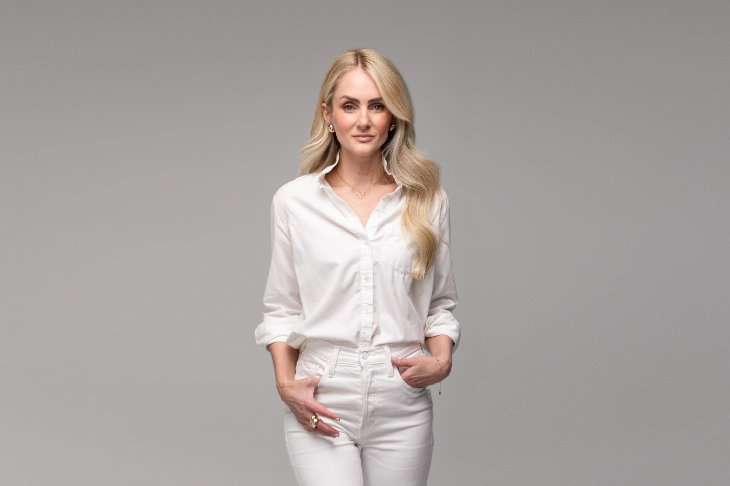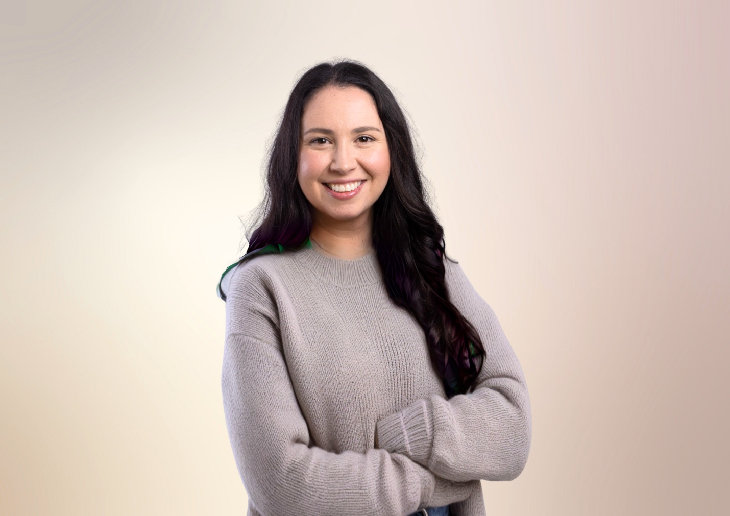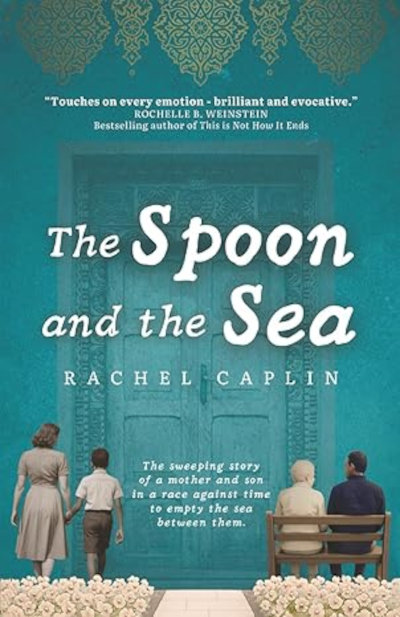It’s no secret that anti-Jewish hate has infiltrated the publishing industry since October 7, 2023. Jewish authors have been blacklisted, dropped from their publishers, targeted in coordinated campaigns to review-bomb their books, and more.
If anyone’s attuned to the real-world implications of antisemitism in publishing, it’s Zibby Owens. Zibby is the founder and CEO of Zibby Media, a bestselling author and editor, an indie bookshop owner, and host of the podcast Totally Booked with Zibby.
Zibby says, “Antisemitism in the publishing industry has been well-documented since 10/7 and has been pervasive from festivals and bookstores to agents and publishers. Personally, I’ve been told directly that select authors wouldn’t come on my podcast and certain bookstores wouldn’t stock the books I publish due to my public support of Israel and the Jewish people. My own books have been targeted on GoodReads and I’ve been called a ‘Zionist racist’ among many other slights. But I’m just one of the many, many Jewish authors in this situation. This is the world for us right now.”
My own books have been targeted on GoodReads and I’ve been called a ‘Zionist racist.’ But I’m just one of the many, many Jewish authors in this situation.
The injustice is clear, but the question remains: How do we choose to respond?
In Zibby’s case, her response was to conceive and edit the anthology On Being Jewish Now, a collection of essays describing what it feels like to be Jewish in this moment in time. But Zibby’s not alone—75 authors and advocates joined her in this effort, each contributing their voice to the cause. (The book became a USA Today Bestseller, and all profits are donated to Artists Against Antisemitism.)
This is just one example of Jewish authors standing together in solidarity against the hate. Zibby explains, “The intense targeting of us as a group has bonded us with each other and with the Jewish community. There’s a support infrastructure across community centers, synagogues, on social media and more.”
When hate tries to tear us down, themes of Jewish resilience prevail. Alyssa Rosenheck and Rachel Caplin are just two of the authors who stood their ground and refused to abandon their identity in the face of adversity. Here are their stories.
Alyssa’s Story
Alyssa Rosenheck is a bestselling author, speaker, and one of Architectural Digest’s Top 50 Interior and Architectural Photographers in the United States. Her debut book, The New Southern Style (Abrams, 2020), reframed creativity as a vehicle for resilience, courage, and connection—showing how art can humanize our differences and remind us of our shared humanity.
In 2022, Alyssa began developing her second book (a non-fiction concept centered around creativity), working with an editor at a well-known publishing company for almost a year.
 Alyssa Rosenheck (photo: Nate Griffin)
Alyssa Rosenheck (photo: Nate Griffin)
After multiple iterations of fine-tuning directly with the editor, Alyssa landed on a version that all parties were excited about. “There was initial buzz, there was great positive feedback…it was very well-received. I even heard the words, ‘You knocked it out of the park,’” Alyssa recalls. Her book proposal was officially submitted to the publisher at the end of September 2023.
October 7th was eleven days later. “Without hesitation, I shifted my content,” Alyssa says. “Overnight I went from sharing interiors and helping women tap into their creativity to educating against antisemitism, exposing Hamas, pushing back against the BDS movement, and fighting the tidal wave of misinformation.”
My content had essentially shifted from homes to Hamas overnight, and suddenly that door shut.
A few weeks later, Alyssa received the news from her agent—the publisher passed on her project. “My literary agent expressed such deep confusion because that just was not the tone, and their reasoning didn’t add up in any capacity.”
While the official excuse was that Alyssa didn’t have enough coaching experience, she knew this was not only false, but irrelevant. “I knew immediately what had happened,” she says. “When a publisher considers acquiring a book, they comb through everything—websites, socials, your public voice. My content had essentially shifted from homes to Hamas overnight, and suddenly that door shut.”
Alyssa explains, “In publishing, antisemitism rarely declares itself directly—it doesn’t come with blatant swastikas. It comes dressed as professional excuses. The message was very clear: I was welcome as long as I talked about creativity and beauty, but the very moment I educated about antisemitism, or spoke truth about Israel, or declared myself as a very proud Zionist, I was no longer tolerated or accepted.”
Reclaiming the Narrative
Alyssa pulled strength from the resilience of her ancestors. “I’m a fighter,” she says. After that rejection came a new mantra: “When they push you down, you have to double down in truth.”
“I doubled down in truth and service,” Alyssa recalls. “I have traveled to Israel three times during the war, bearing witness and amplifying the voices of hostages and their families. I’ve sat in rooms with Heads of State and Ambassadors working to broker peace. Here in the United States, I work closely with organizations such as AJC, ADL, and one of our greatest allies—CUFI. I continue to expose the BDS movement for what it truly is—a dangerous campaign intent on eradicating Israel. By challenging local BDS-backed city resolutions, strengthening civic advocacy, and raising national awareness through op-eds, I am committed to ensuring their agenda is not only exposed but defeated.”
I wrote a brand new book and let my haters title it—I took the three words that were meant to silence me (White. Blonde. Jew.) and made them my forthcoming title.
On top of all that, Alyssa didn’t stop creating. “I wrote a brand new book and let my haters title it—I took the three words that were meant to silence me (White. Blonde. Jew.) and made them my forthcoming title.” Alyssa describes the book as “transmuting hate into education—a call to end extremism, building bridges stronger than those who are continuing to try to burn them down.”
Given this departure from the genre of her debut book, Alyssa knew she needed a new literary agent. One night shortly after the war began, Alyssa was vocal about current events at a book club meeting with fellow authors—the woman sitting next to her took notice. As fate would have it, an enthusiastic partnership was formed—Alyssa had found her agent.
“It all happened pretty organically. My publisher is BenBella and they’re distributing through Simon & Schuster, and they’re brave—they saw something in the content of this project that needs to be platformed and heard. I also was very mindful of selecting an Israeli publisher. In response to the global boycott targeting Jewish authors and Israeli publishers, it was important for me to carve out space for an Israeli publisher alongside my U.S. publisher, so I’m partnering with Gefen Publishing in Israel.”
Alyssa notes, “This isn’t just my story of rejection—this is what’s been happening to us globally for the past two years against Jewish authors and Israeli publishers. Voices like Zibby and other Jewish authors have been hugely supportive, and vice versa. We have all banded together and are supporting each other—because we can’t be complicit in our own erasure.”
White. Blonde. Jew. hits bookshelves April 2026 and is now available for pre-order. (Personally, supporting an author who so boldly stands tall in the face of hate will be the easiest decision I make all year.) April can’t come soon enough.
Rachel’s Story
Rachel Caplin is the author of bestselling The Spoon and the Sea, a historical fiction novel that was shortlisted for the Australian Vogel Literary Award. Originally from Australia, she moved to Israel in 2015, where she balances her writing with a career in tech and a busy family life with her husband and their three young daughters.
 Rachel Caplin (courtesy)
Rachel Caplin (courtesy)
In 2022, Rachel was encouraged to submit her manuscript to the prestigious Australian Vogel Literary Award—her work earned a coveted spot in the top three. This high praise and exposure helped Rachel secure a contract with a global literary agency. After working through developmental edits, the plan was to shop her manuscript around to publishers at the Frankfurt Book Fair on October 17, 2023.
“The timing of that was, of course, not in my favor,” Rachel recalls. “I had this momentum and the credentials—a big award, a respected agency—and suddenly the responses from publishers shifted dramatically.” In the wake of October 7th, she began to hear a common refrain: It isn’t the right time.
In response to this jarring change of tune, Rachel’s agency suggested positioning her as an Australian author (which she refused to do). She then noticed that a bio being circulated suggested she had ‘relocated to Tel Aviv to work in tech.’ “I’ve never lived in Tel Aviv, and I didn’t move here for tech,” Rachel clarifies.
Though she says she was never blacklisted, Rachel felt the climate had changed. “There was an undercurrent that the book had become unpalatable or that the risk of backlash was too high. The novel has strong Jewish themes, part of it is set in Israel, my name is very clearly Jewish, and I live in Israel—it isn’t something I could or would want to hide.”
I broke away from the agency when they shared content that vilified Israel while I was quite literally sheltering my three young children from ballistic missiles.
“I remember at one point asking my agent point-blank: ‘If I submitted the manuscript today to the same award, would they select me and feature me in the newspaper?’ And she said, ‘Absolutely not.’ The very same book and author that were celebrated in 2022 became taboo in 2023.”
Rachel knew she couldn’t continue on this path. “The tipping point came in June during the twelve days of war with Iran,” she recalls. “I broke away from the agency when they shared content that vilified Israel while I was quite literally sheltering my three young children from ballistic missiles.”
Reclaiming the Narrative
As an Israeli debut author suddenly without an agent, Rachel decided to reach out directly to Jewish authors in the U.S. (complete strangers at the time) who had voiced solidarity with Israel and spoken openly about the climate in publishing. She hoped to find someone who would not only read her book, but love it enough to write a review. (In short, Rachel’s not just a talented author—she’s got chutzpah too.)
“It was a leap of faith,” she admits. “I didn’t know them personally. I had no expectations that anyone would even respond to my email.”
To her surprise, many did. “I was blown away by the generosity,” Rachel says. “Several bestselling authors responded and offered not just to read my book, but to review it publicly and put their names behind it. It was incredibly moving.”

Rachel didn’t take their acts of kindness for granted, and has begun to forge friendships with many of these amazing authors. “The connectivity between Jews inside of Israel and out—I found it to be an amazing display of solidarity,” she reflects. “What stays with me is the supportiveness of this community. At a time when being Jewish and Israeli can feel isolating, connecting with this community of talented, brave people has been one of the most valuable outcomes—and it’s something I hope to give back to in a meaningful way.”
The Spoon and the Sea was published in July (available in paperback and e-book). The book was the #1 Top New Release on Amazon in three categories: Jewish Historical Fiction, Middle Eastern Literature and Middle Eastern Historical Fiction.
When you grab your copy, know you’re not only lifting up a talented member of the tribe…but the entire community of authors who supported her.
This op-ed originally appeared in the Times of Israel Blogs.

